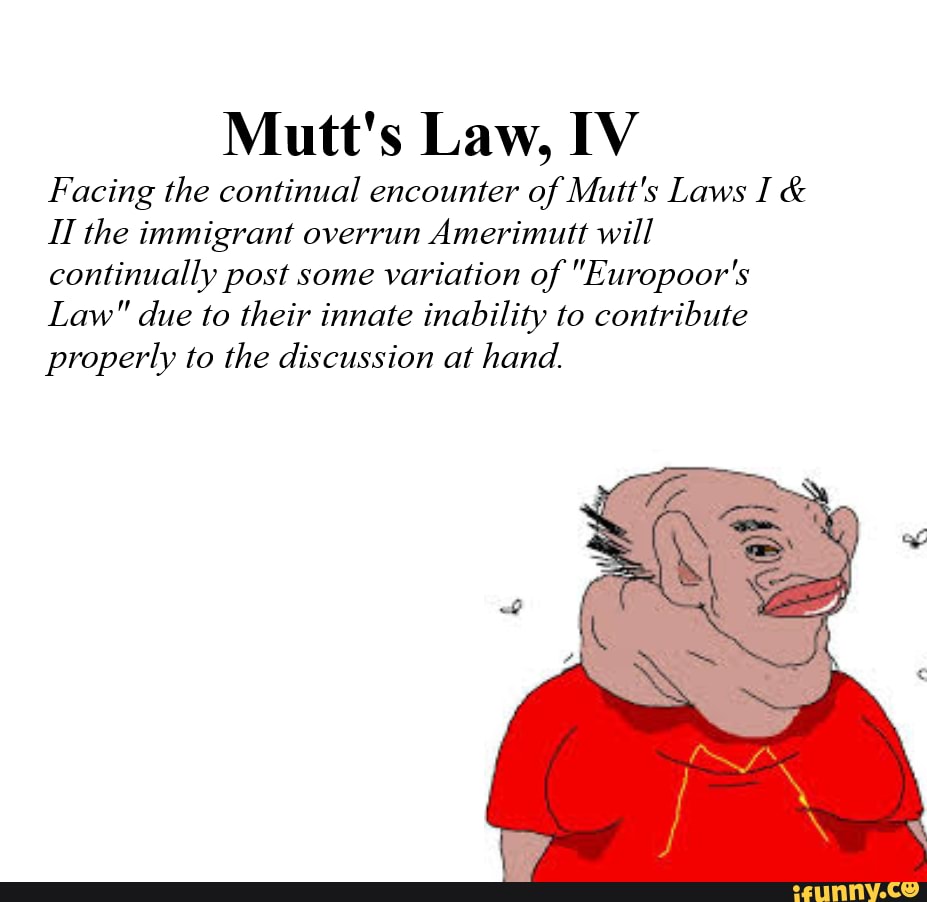Mutt's Law: A Comprehensive Guide To Understanding And Implementing This Important Legal Principle
Mar 26 2025
Mutt's Law is a fascinating legal concept that has garnered significant attention in recent years, especially in the realm of property law and real estate transactions. This law plays a crucial role in shaping how disputes are resolved and ensuring fair practices between parties involved in property-related matters. Whether you're a homeowner, tenant, or legal professional, understanding Mutt's Law is essential for navigating the complexities of modern property law.
At its core, Mutt's Law addresses key issues surrounding property rights, obligations, and the resolution of disputes. It serves as a guiding principle for ensuring that all parties involved in property transactions are treated fairly and equitably. As the legal landscape continues to evolve, staying informed about Mutt's Law is more important than ever.
This article will provide a detailed exploration of Mutt's Law, covering its origins, key principles, practical applications, and its relevance in today's legal environment. By the end of this guide, you'll have a comprehensive understanding of how Mutt's Law impacts property law and how it can be applied in real-world scenarios.
Read also:Mia Z Girth Master Videos Exploring The Rise Impact And Facts
Table of Contents
- The Origin and Development of Mutt's Law
- Key Principles of Mutt's Law
- Mutt's Law Within the Legal Framework
- Applications in Real Estate Transactions
- Impact on Property Rights
- Dispute Resolution Under Mutt's Law
- Challenges and Criticisms
- Case Studies and Real-Life Examples
- Future Trends and Developments
- Conclusion and Call to Action
The Origin and Development of Mutt's Law
Mutt's Law originated from a series of landmark legal cases that sought to address inconsistencies in property law. Initially developed in the early 20th century, this legal principle gained prominence as property disputes became more complex. Over time, Mutt's Law evolved to incorporate modern legal principles and technological advancements.
Historical Context
The historical context of Mutt's Law is deeply rooted in the need for fair and equitable treatment of all parties involved in property transactions. Early versions of the law focused on resolving disputes related to property boundaries and ownership rights. As urbanization accelerated, the scope of Mutt's Law expanded to include issues such as zoning regulations and tenant rights.
Modern Developments
In recent years, Mutt's Law has been further refined to address emerging challenges in the real estate industry. With the rise of digital property records and smart contracts, the law has adapted to ensure that all stakeholders are protected in an increasingly digital world.
Key Principles of Mutt's Law
Mutt's Law is built on several foundational principles that guide its application in legal and real estate contexts. These principles ensure that property transactions are conducted fairly and transparently.
- Equity and Fairness: Ensuring that all parties involved in property transactions are treated equitably.
- Transparency: Promoting openness in all aspects of property dealings, including documentation and communication.
- Accountability: Holding parties accountable for their actions and obligations in property-related matters.
Mutt's Law Within the Legal Framework
Mutt's Law operates within a broader legal framework that includes federal, state, and local regulations. Understanding how Mutt's Law interacts with these regulations is essential for legal professionals and property owners alike.
Jurisdictional Variations
While the core principles of Mutt's Law remain consistent, there are variations in how it is applied across different jurisdictions. These variations often reflect local customs, regulations, and legal precedents.
Read also:Sydney Brown Simpson The Rise Of A Prominent Figure In Contemporary Media
Compliance Requirements
Complying with Mutt's Law requires adherence to specific legal standards and procedures. Legal professionals must stay updated on changes in legislation to ensure that their clients remain compliant with the law.
Applications in Real Estate Transactions
Mutt's Law plays a critical role in real estate transactions, providing a framework for resolving disputes and ensuring fair practices. Its applications range from property sales and rentals to zoning disputes and property management.
Property Sales
In property sales, Mutt's Law ensures that buyers and sellers are treated fairly throughout the transaction process. This includes provisions for due diligence, contract transparency, and dispute resolution.
Rental Agreements
For rental agreements, Mutt's Law protects the rights of both landlords and tenants. It establishes clear guidelines for lease terms, security deposits, and eviction procedures, ensuring that both parties are aware of their obligations and rights.
Impact on Property Rights
Mutt's Law has a profound impact on property rights, influencing how ownership, usage, and transfer of property are managed. By establishing clear legal standards, Mutt's Law helps prevent disputes and promotes harmony among property stakeholders.
Ownership Rights
Ownership rights under Mutt's Law are protected through detailed documentation and legal procedures. This ensures that property owners have the necessary tools to defend their rights in legal disputes.
Usage Rights
Usage rights are also addressed under Mutt's Law, providing guidance on how property can be used and maintained. This includes regulations on zoning, land use, and environmental considerations.
Dispute Resolution Under Mutt's Law
One of the key strengths of Mutt's Law is its focus on effective dispute resolution. By providing clear procedures for resolving conflicts, Mutt's Law helps minimize legal costs and delays for all parties involved.
Mediation and Arbitration
Mutt's Law encourages the use of mediation and arbitration as alternative dispute resolution methods. These processes are often faster and less expensive than traditional litigation, making them an attractive option for resolving property disputes.
Court Proceedings
When disputes cannot be resolved through alternative methods, Mutt's Law provides a structured framework for court proceedings. This ensures that all parties have access to fair and impartial legal representation.
Challenges and Criticisms
Despite its many benefits, Mutt's Law is not without its challenges and criticisms. Critics argue that the law can be overly complex and difficult to implement in certain situations. Additionally, there are concerns about its applicability in rapidly changing legal environments.
Complexity and Implementation
The complexity of Mutt's Law can pose challenges for legal professionals and property owners alike. Ensuring that all parties fully understand and comply with the law requires ongoing education and training.
Adaptability to Change
As the legal and real estate landscapes continue to evolve, there are concerns about Mutt's Law's ability to adapt to new challenges. Legal professionals must remain vigilant in monitoring changes and updates to the law to ensure continued relevance and effectiveness.
Case Studies and Real-Life Examples
To better understand the practical applications of Mutt's Law, it is helpful to examine real-life case studies and examples. These cases illustrate how the law is applied in various situations and highlight its strengths and limitations.
Case Study 1: Property Boundary Dispute
In a recent case involving a property boundary dispute, Mutt's Law was instrumental in resolving the conflict between two neighboring property owners. Through mediation and legal proceedings, the parties were able to reach a mutually agreeable solution.
Case Study 2: Rental Agreement Violation
Another case involved a tenant alleging violations of their rights under a rental agreement. Mutt's Law provided the necessary legal framework for addressing the tenant's concerns and ensuring a fair resolution.
Future Trends and Developments
As technology continues to transform the legal and real estate industries, the future of Mutt's Law looks promising. Innovations in digital property records, smart contracts, and artificial intelligence are expected to enhance the law's effectiveness and adaptability.
Technological Advancements
Technological advancements such as blockchain and AI are likely to play a significant role in shaping the future of Mutt's Law. These technologies offer new opportunities for improving transparency, efficiency, and accountability in property transactions.
Global Perspectives
From a global perspective, Mutt's Law has the potential to influence property law in countries around the world. As international property transactions become more common, the principles of Mutt's Law could serve as a model for ensuring fair and equitable practices worldwide.
Conclusion and Call to Action
Mutt's Law is a vital legal principle that continues to shape the landscape of property law and real estate transactions. By providing a framework for fair and equitable practices, Mutt's Law ensures that all parties involved in property matters are treated with respect and dignity.
To stay informed about the latest developments in Mutt's Law, we encourage readers to explore additional resources and engage with legal professionals. Your feedback and insights are invaluable in helping us improve our understanding of this important legal concept.
We invite you to share this article with others who may benefit from learning about Mutt's Law. Together, we can promote greater awareness and understanding of this critical legal principle. For further reading, consider exploring related topics such as property rights, dispute resolution, and emerging trends in real estate law.


